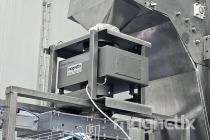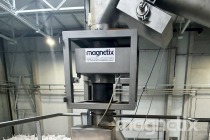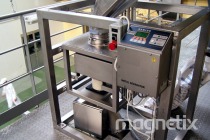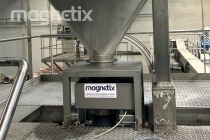Products
In-line metal detector DMO
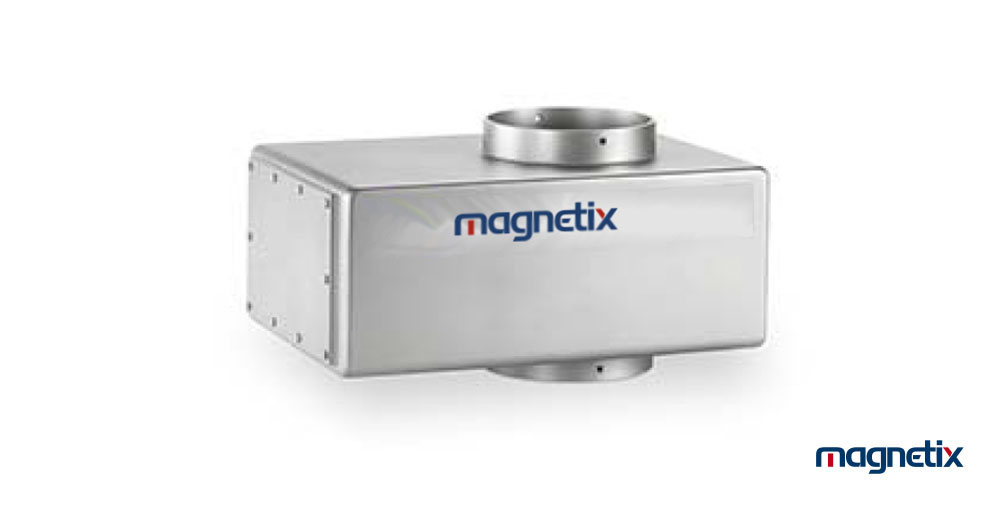
The DMO type in-line metal detector is designed to detect ferrous and non-ferrous metals in loose, fibrous, liquid or pasty materials transported in pipelines with the highest precision. It is used in free fall, pneumatic and pressure transport systems. The DMO detector protects process machines against damage caused by metal contamination, prevents production downtime and ensures product quality.
The DMO metal detector is reliable, easy to use and designed for continuous operation. The metal detector is characterized by the highest sensitivity of metal detection in the entire area of the transport tunnel. The DMO detector meets the requirements of food quality management systems ISO 9001, ISO 22000, HACCP, BRC, IFS.
Features of in-line metal detectors from Magnetix
- Custom-made in-line metal detector according to individual requirements.
- Robust and durable design for continuous operation 24/7 under difficult working conditions.
- High detection sensitivity of ferrous and non-ferrous metals as well as stainless steel.
- State-of-the-art DSP digital signal processing technology.
- No dead zones - high sensitivity in the entire area of the transport tunnel.
- Adaptable to all types of pipelines.
- Inlet diameter ranging up to 600 mm.
- Hygienic design with materials approved for contact with food (FDA approved).
- High resistance to vibration, shocks, and temperature fluctuations.
- Operating temperature up to 80°C.
- Intuitive operation using a membrane keyboard or touch screen.
- Electronic adjustment of scanning sensitivity.
- Automatic teach-in mode (Auto-Set) to mask out intrinsic conductivity of products and environmental influence.
- Memory for 300 different products.
- Control audit in accordance with the requirements of HACCP, IFS, BRC systems.
- Event log with RTC real-time clock with power backup.
- Data transmission from the detector and connection to the company network.
- Remote operation, diagnostics and central data management.
Applications of in-line metal detectors
- Detection of metals in dusty food products (sugar, coffee, flour, spices, milk powder, breadcrumbs, etc.)
- Metal detection in fine grain food products (cereals, pasta, chips, popcorn, grains, nuts, etc.)
- Testing of liquid and pasty products (jams, chocolate, soups, mustard, ketchup, sauces, soft cheese, processed cheese).
- Inspection of ingredients of pharmaceutical products.
- Detection of metals in plastic regrinds and granulates - protection of extruders and calenders.
- Metal detection in limestone powders and construction mixtures.
- Inspection of loose or granulated artificial and mineral fertilizers.
The DMO in-line metal detector is widely used in industry, provides the highest sensitivity of detection of metal contaminants and guarantees the purity of the processed product.
Versions of in-line metal detectors
- DMO-IP66 / IP69 type metal detector
Dustproof and rainproof design. - DMO-DUO type metal detector
Multi-frequency technology for inspection of difficult products. - DMO-EX type explosion-proof detector
Manufactured in compliance with the ATEX directive and certified by a notified body.
DMO metal detector accessories
- Optical and acoustic signal system.
- Separation units - quick-flap or swivel funnel.
Working principle of the in-line metal detector
The tested product moves through the metal detector tunnel. The detector creates a high-frequency electromagnetic field throughout the entire transport tunnel area - no dead zones. The electromagnetic field generated by the transmitting coil induces a certain signal in the receiving coil. The metal contained in the product deforms the electromagnetic field lines generated by the transmitting coil, thereby changing the amplitude and phase of the signal induced in the receiving coil. The received signal is analyzed by the detector's electronic system and converted into a metal detection signal. The metal detector detects iron and its alloys, including stainless steel and acid-resistant steel, and non-ferrous metals such as aluminium, copper, brass, zinc, lead, silver, etc. The scanning sensitivity is adjusted using a digital control unit.
Why choose our in-line metal detectors?
DMO in-line detectors can operate in a horizontal or vertical position, depending on the user's application. Detectors are available with inlet diameters from 30 to 600 mm, which allows adaptation to most existing gravity or pressure transport systems. Thanks to the undivided structure (monoblock), they have a short metal-free zone, which saves time and space for installation in an existing installation. DMO detectors can work with simple PRIMUS type controllers in the plastics industry or with advanced GENIUS or INTUITY type controllers in the food and pharmaceutical industries. DMO detectors can also be used in other industries and even in potentially explosive atmospheres (ATEX).
Advanced control units with multi-range search frequency (DUO technology) enable optimal detection sensitivity and the highest product purity. A touch display with visualization of the product and ongoing processes enables simple operation and saves time by quickly setting the detector parameters. The quality control program complies with IFS, BRC, HAACP and ISO 22000 standards. DMO in-line detectors can be equipped with interfaces enabling communication in technological networks. This allows you to save time by communicating with an individual device and monitoring work in real time. Factory certificates and approvals, which the customer receives upon request, are solid arguments during internal and external audits.
Price and delivery time
Based on the working conditions specified by the Customer, the appropriate type of detector is selected and its price is determined, which depends primarily on the diameter of the inlet opening and the type of electronics used to evaluate the data. Mounting accessories are priced individually based on an analysis of the specific location of the device.
The delivery time of the device on order is usually 4 - 6 weeks. We also fulfill orders with an accelerated deadline. Magnetix also has a large warehouse of detectors available immediately.







